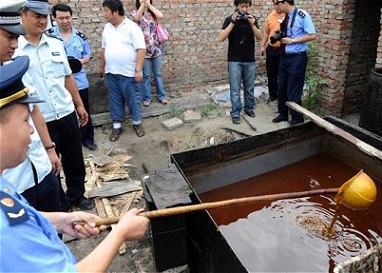China Pollution
Air, Water & Food Pollution In China
China's Air, Water, Soil and Food Pollution
The level of air pollution, water pollution, soil pollution, and food pollution in China is hard to grasp for those who have not been to China or India.

Air Pollution In China
The left photo is from an airplane about to take off from an American airport. The right photo is from the same airplane twelve hours later as it begins descending toward a city in China; the grayish-brown haze is air pollution, not storm clouds.
According to the World Health Organization, air is healthy to breathe if its concentration of PM2.5 pollutants, which are small enough to penetrate and damage the lung's alveoli, is between 0 to 25 parts per million (PPM). In China, PM2.5 pollutant levels regularly exceed 150 PPM (above right), causing respiratory and skin diseases. When China burns coal for heat during winter, that PM2.5 level regularly doubles and sometimes triples or quadruples. A 2015 study concluded that air pollution kills 4,000 people daily in China.*
Water and Soil Pollution in China
The pollutants spewed into China's air eventually pollute its lakes, rivers and soil. China also annually produces over 60,000,000,000 tons of sewage, and in rural areas 90% of it is poured untreated into lakes and rivers, which irrigate the fields.** Much of China's industrial waste is also dumped untreated into its rivers, lakes and soil.
The Chinese government's 2014 national soil survey found that 16.1% of China's soil and 19.4% of its farmland were contaminated by organic and inorganic chemical pollutants and by metals such as lead, cadmium and arsenic. Cadmium and arsenic, both carcinogens, were found in 40% of the affected land.** In a 2015 survey, China' Ministry of Water Resources found that 80% of the groundwater in China’s major river basins was unsafe for human "contact," let alone human consumption.***
Doesn't China have laws against pollution?
China's laws against pollution tend to be weak, ignored, unenforced and/or circumvented. For example, factories stop using filters in their smokestacks and pour untreated industrial waste into rivers or underground through sunk pipes, and then pay a fine or a bribe if caught as that costs less than complying with China anti-pollution laws.
Can China's pollution be cleaned up?
If the polluting stops, the pollutants in China's air blow away in a matter of days and blue skies reappear. The same unfortunately cannot be said about China's water and soil pollution. The pollutants in China's rivers and lakes will take years to wash away, but the heavy metals in China's soil will remain for at least centuries.
Food Pollution in China
The fruit, vegetables, grain, livestock and fish that grow in China's air, water and soil are contaminated. In 2002, China’s Ministry of Agriculture conducted a rare nationwide test to look for heavy metals in rice and found that 28% of the rice samples it took from across China had excess lead and 10% had excess cadmium,** a carcinogen that the human liver and kidneys cannot eliminate from the body. These percentages are higher today.
 China's
food safety also suffers from food providers' ruthless schemes that
threaten human life (see China Threat). Examples
include lacing baby milk with the industrial chemical melamine to mask dilution of the milk with water;
using other poisonous chemicals to make pork look and taste like the more
expensive beef; stuffing steamed buns with ground cardboard instead of
ground pork; selling rat meat as mutton; and selling fake eggs made from resin, wax,
coagulants and calcium carbonate. An estimated 10% of all restaurant meals in China
are cooked in toxic "gutter oil" (above) that already has been used and
discarded as waste by other restaurants and hotels.
China's
food safety also suffers from food providers' ruthless schemes that
threaten human life (see China Threat). Examples
include lacing baby milk with the industrial chemical melamine to mask dilution of the milk with water;
using other poisonous chemicals to make pork look and taste like the more
expensive beef; stuffing steamed buns with ground cardboard instead of
ground pork; selling rat meat as mutton; and selling fake eggs made from resin, wax,
coagulants and calcium carbonate. An estimated 10% of all restaurant meals in China
are cooked in toxic "gutter oil" (above) that already has been used and
discarded as waste by other restaurants and hotels.
Who wants to live in such a society?
Apparently not those with the means to leave. A recent survey of 20,000 Chinese with investment assets of at least 100 million Yuan (about $15 million) showed that 74% of them had left or were considering leaving: 27% already had emigrated while another 47% were considering emigration.
Is there anything that can stem this financial and brain drain?
The only antidote, and one that can not only stem this tide but also hold the Chinese society together in its accelerating rat race, is the Gospel. When they heed it, students stop cheating, industrialists stop polluting, food preparer stop selling poison, and government officials stop taking bribes. Instead, they become honest, obey the law, and extend the "golden rule" to their outer circle (see China Threat).
* theguardian.com/world/2015/aug/14/air-pollution-in-china-is-killing-4000-people-every-day-a-new-study-finds
** economist.com/news/briefing/21723128-and-fixing-it-will-be-hard-and-costly-most-neglected-threat-public-health-china
*** scmp.com/news/china/policies-politics/article/1935314/80-cent-groundwater-chinas-major-river-basins-unsafe